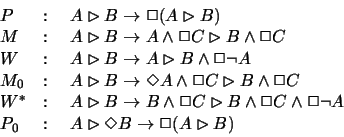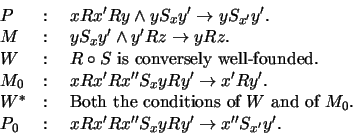

The logic
![]() is known to be precisely
is known to be precisely
![]() .
See for example
[Vis97]. All the logics we will consider over
.
See for example
[Vis97]. All the logics we will consider over
![]() ,
will
have the deduction theorem. The principle P0 is introduced here for
the first time. The principles P, M, etc., do not hold on every
,
will
have the deduction theorem. The principle P0 is introduced here for
the first time. The principles P, M, etc., do not hold on every
![]() -frame. One can examine which condition the frame should satisfy
in order to have the principle to hold. We obtain the following list
of frame correspondences:
-frame. One can examine which condition the frame should satisfy
in order to have the principle to hold. We obtain the following list
of frame correspondences:

Instead of the formula one could read its universal closure. The frame
condition of W is not first-order expressible though. The general
problem of first order definability of a frame condition is known to
be undecidable even in pure modal logic, and presumably even for
extensions of Löbs logic, see Chagrova [Cha91], and is
conjectured by van Benthem to be much worse. In [Ben84] he
shows that the first-order definability for monadic second-order
![]() sentences of a restricted form is non-arithmetically
definable. The situation with interpretability logic is likely to be
at least as complex. In a joint paper, Carlos Areces, Dick de Jongh
and Eva Hoogland establish the interpolation property for
sentences of a restricted form is non-arithmetically
definable. The situation with interpretability logic is likely to be
at least as complex. In a joint paper, Carlos Areces, Dick de Jongh
and Eva Hoogland establish the interpolation property for
![]() ,
see
[AdJH98]. As
,
see
[AdJH98]. As
![]() is a ``nice'' logic and as it has
interpolation, they show, it must have the Beth property and hence
fixed points; so any logic
is a ``nice'' logic and as it has
interpolation, they show, it must have the Beth property and hence
fixed points; so any logic
![]() has fixed points and thus,
generalizing a result of Maksimova, also the Beth property.
has fixed points and thus,
generalizing a result of Maksimova, also the Beth property.